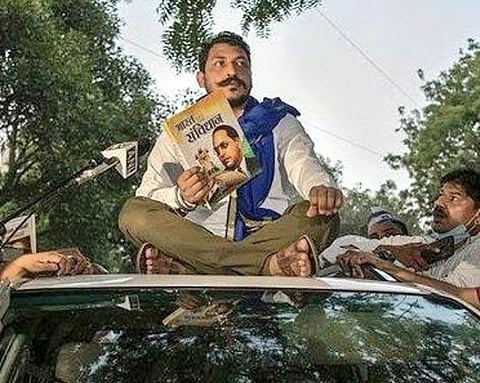
New Delhi: The 2024 Lok Sabha election results have revitalized political forces like the Samajwadi Party (SP) while plunging others, such as the Bahujan Samaj Party (BSP), deeper into turmoil. Uttar Pradesh has been full of surprises this election, and the emergence of Chandrashekhar Azad as a significant political force is more than just another unexpected turn.
The Bhim Army chief and co-founder of the Aazad Samaj Party secured a remarkable victory from the Nagina parliamentary constituency with a margin comparable to Prime Minister Narendra Modi’s in Varanasi. This outcome indicates a significant shift in Dalit voters’ allegiance, highlighting a new leader in the space long dominated by Mayawati. Her party’s dwindling vote share in recent Assembly and Lok Sabha elections starkly contrasts with Chandrashekhar’s rise.
Unlike Mayawati’s detached approach, Chandrashekhar’s reputation as a street-fighter resonates with the youth. He avoids directly criticizing the BSP president in his speeches, instead focusing on the legacies of Dr BR Ambedkar and Kanshi Ram, as well as the Constitution and the rights of the Dalit community.
Chandrashekhar’s ascent was not initially perceived as a threat to Mayawati. However, his entry into the Lok Sabha, coupled with the BSP’s absence, has firmly established him in the political arena.
Landmark Victory
He clinched the Nagina seat with an impressive margin exceeding 1.5 lakh votes. He secured 51.18 percent of the votes; whereas, BJP’s Om Kumar garnered 36 percent. The BSP candidate, Surendra Pal Singh, finished in fourth place with a scant 1.33 percent, resulting in a lost deposit.
Chandrashekhar’s triumph did more than challenge Mayawati’s dominance over Dalit voters; it also disrupted SP chief Akhilesh Yadav’s PDA (Pichhda or backward, Dalit and Alpsankhyak or minorities) strategy, which had succeeded in other parts of UP.
By effectively mobilizing both Dalit and Muslim voters, Chandrashekhar reduced the SP candidate, Manoj Kumar, to just 10.2 percent of the vote. The Nagina constituency, comprising 20 percent Dalits and approximately 40 percent Muslims, saw a significant shift, particularly among the Jatavs who traditionally supported Mayawati.
Notably, the Azad Samaj Party was not aligned with the INDIA bloc, and Chandrashekhar’s attempts to forge an alliance with Akhilesh Yadav failed, leaving him as the sole candidate from his party in this election. Despite facing multiple imprisonments for his activism, including during the anti-CAA protests, his victory marks the rise of a new leader for the marginalized, filling the gap left by Mayawati’s waning influence.
Previously known as Ravan, Chandrashekhar dropped the name before the 2019 elections to avoid polarizing the electorate. He founded the Bhim Army in 2014, running schools for marginalized children in Western UP. In 2016, Dalits in his village, Ghadkauli, put up a board proclaiming it “Da Great Chamar, Dr Bhimrao Ambedkar Village”.
UP’s Emerging Political Leader
Chandrashekhar’s win in Nagina is historically significant, as the constituency was part of Bijnor, from where Mayawati entered the Lok Sabha in 1989. Post-delimitation, Nagina voters have supported different parties in each election. Mayawati’s distancing from grassroots politics provided Dalits with an opportunity to rally behind a new leader. Chandrashekhar capitalized on this, working diligently on the ground for years and making Nagina his karmabhoomi.
At 37, the Saharanpur native has engaged in symbolic politics by linking his party’s name to Kanshi Ram, Mayawati’s mentor. Chandrashekhar gained prominence in 2017 when he was charged under the National Security Act (NSA) for allegedly inciting caste violence in Saharanpur, leading to a year-long imprisonment.
Since then, he has been a vocal advocate against Dalit violence, participating in various demonstrations, including anti-CAA protests and opposing the demolition of Delhi’s Ravidas Mandir.
Despite facing an assassination attempt last June and being granted ‘Y plus’ security this year, his popularity continues to grow, especially among the youth.
Dalits in Nagina expressed anger towards Mayawati for neglecting their issues, which Chandrashekhar actively addressed.
This election was crucial for Chandrashekhar and his party, especially after his loss in the 2022 Assembly elections against Yogi Adityanath in Gorakhpur, where he secured only 4,501 votes.
This time, he demonstrated political acumen by uniting Dalits and Muslims, a combination neither the BJP nor the SP could counter. Despite the SP’s strong Muslim support in UP, Nagina’s Muslim community backed Chandrashekhar.
After his victory, Chandrashekhar expressed gratitude, stating, “The Muslim community voted as much as the Dalits did. I will not be able to repay this favor in my entire life.”
Grassroots Campaign
Chandrashekhar’s assertive politics and impactful public engagement distinguish him from other leaders. Although his influence is currently limited to Western Uttar Pradesh, his recent victory might unsettle Mayawati’s camp.
He made numerous attempts to join the BSP, praising Mayawati, but received little attention. However, his door-to-door campaign, focus on the Constitution, and efforts to unite Dalits and Muslims were pivotal in his election win.
To garner Muslim support, he conducted roadshows and door-to-door campaigns in Nagina’s Muslim settlements. Additionally, many BSP leaders joined his party before the election, weakening BSP’s grassroots support.
For years, Uttar Pradesh was said to lack a strong Dalit political voice. Chandrashekhar’s victory represents a step toward filling that void. His challenge now is to expand his influence across India’s largest state, home to a significant Dalit population, and to forge new political equations for broader acceptance.
You can also join our WhatsApp group to get premium and selected news of The Mooknayak on WhatsApp. Click here to join the WhatsApp group.